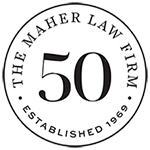What Is Your Case Worth?
Our Orlando Personal Injury Lawyers Explain
One of the most common questions that we at The Maher Law Firm hear during our initial consultations with personal injury clients is, “What is my case worth?” There is no one-size-fits-all answer. Each case is different. Because parties, facts, and circumstances vary, no two recoveries will ever be the same. However, you can look at two factors in order to get a better understanding of your case’s potential value: The amount of losses you have suffered and the amount of available insurance coverage. Let’s take a closer look at each of these factors.
Amount of Losses
In a personal injury lawsuit, the losses that you suffer can be placed into different categories of damages.
The most common types of damages are:
- Property damage – You may recover the cost of repairing your vehicle or the cost of replacing it. If an insurer decides to replace your vehicle rather than paying for repairs to it, you should receive the actual cash value of the car.
- Medical expenses – You should be compensated for all past and future medical costs, including emergency room treatment, operations, prosthetics, assistive devices, medication, and therapy. Medical billing records and expert analysis can be used to arrive at this figure.
- Lost income and diminished earning potential – You should recover for all income you cannot earn due to your injuries. The damages should include the difference between what you earned before your injuries and the amount you can earn after your injuries if you are unable to return to your previous job.
- Pain and suffering – If you have suffered serious, catastrophic injuries, your recovery should reflect the tremendous amount of pain you have suffered. Even a minor injury such as whiplash can lead to chronic and enduring pain. The amount of pain and suffering damages should be much higher if you are left with a permanent injury.
- Mental anguish – The type of incident that led to your physical injuries may leave you with mental harm as well. Anxiety, depression, flashbacks, insomnia, and other symptoms commonly associated with Post-Traumatic Stress Disorder (PTSD) may result.
Exceptions Under Florida Law
Under Florida law, a car accident victim cannot recover for pain and suffering and mental anguish unless the injuries suffered cross the “permanent injury threshold.” This means that the injury must be one that causes:
- Significant and permanent loss of an important bodily function
- Permanent injury within a reasonable degree of medical probability
- Significant and permanent scarring or disfigurement
- Death
In some cases, punitive damages may be awarded. These damages are awarded to punish the party who caused your injuries and to deter future misconduct. They may be allowed if the party showed a reckless disregard for the health and safety of others. Generally speaking, punitive damages will be capped under Florida law at $500,000 or three times the amount of compensatory damages that are awarded – whichever is the greatest.
Amount of Available Insurance Coverage
Although you may suffer extensive losses as the result of another person’s negligence, your recovery will be limited to the amount of insurance coverage that is available in your case. At The Maher Law Firm, our role is to carefully review all insurance policies in your case, including those of all parties responsible for your injuries, as well as your own coverage.
Your recovery may include payment through a combination of these policies, including:
- Personal injury protection (PIP) – In car accident cases, your first option will be to turn to your own PIP benefits. These are available without the need to establish any party’s fault.
- Liability – If your losses go beyond what your PIP benefits cover after a car accident, you may seek to recover from the at-fault driver’s liability insurance coverage.
- Uninsured / Underinsured motorist – If the at-fault driver does not have liability insurance, or if the driver’s insurance does not fully cover your losses, you may turn to your own UM / UIM coverage. If you have multiple vehicles covered by UM / UIM, the policy limits can be “stacked” or added together.
- Homeowner’s insurance – This insurance may be turned to if the injury occurs on another person’s premises, such as a swimming pool.
- Professional liability insurance – This insurance may cover damages caused by a medical or legal professional’s negligence. It is also called malpractice insurance.
There are other factors that may be involved in determining what your case is worth to you. If you contributed in any way to causing your injuries, your recovery may be reduced in accordance with the percentage of fault assigned to you. This is called comparative negligence. For instance, if you are 25 percent at fault, your recovery would be reduced by 25 percent.
While your lawsuit was pending, you may have also received benefits through your healthcare insurance or through workers’ compensation. The insurers who provided that coverage may have a right to a percentage of your recovery. These are called liens on your recovery. If your claim is brought against a local government entity, your recovery may also be limited due to a statutory cap on those damages.
Need Help? Contact The Maher Law Firm Today!
The Maher Law Firm will carefully investigate and evaluate your case. Our Orlando personal injury attorneys will examine evidence establishing why you deserve damages, as well as the amount you should rightfully receive. We will use this information to seek a full and fair settlement. If the other party refuses to pay what we determine your case is worth, we will be ready to take your case to court.
To learn more about our services, contact us today.


